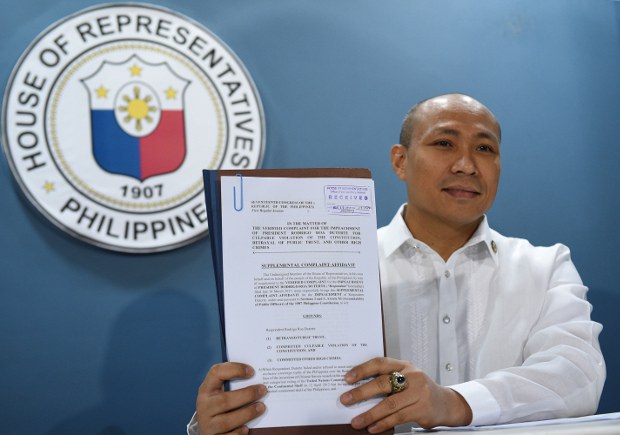Philippine Lawmakers to Tackle Duterte Impeachment Complaint Next Week
2017.05.10
Manila
 Opposition lawmaker Gary Alejano shows a copy of his supplemental impeachment complaint against President Rodrigo Duterte, at the Philippine Congress in Manila, March 30, 2017.
Opposition lawmaker Gary Alejano shows a copy of his supplemental impeachment complaint against President Rodrigo Duterte, at the Philippine Congress in Manila, March 30, 2017.
Philippine lawmakers on Wednesday formally sent an impeachment complaint against President Rodrigo Duterte to a congressional panel, which is to hold hearings on accusations that he orchestrated the “mass murder” of thousands of people in his drug war.
But House of Representatives member Gary Alejano, who filed the complaint for Duterte’s impeachment in March, was holding out hope that it would gather enough votes from the chamber dominated by the president’s allies.
“The impeachment complaint has been referred to the Committee on Justice yesterday afternoon,” Alejano told BenarNews. “The deliberation would be next week, on May 15.”
He said the complaint would be scrutinized by the 292-member chamber for its “sufficiency of form and substance” and whether it presents clearly a “probable cause” to remove the 72-year-old president.
“All these stages will go through the process of voting one after another,” he said. “It will then be reported to the plenary for affirmation or rejection by members of the House.”
The first time the Filipino public witnessed an elected president stand in trial and face possible impeachment was in October 2000, when then-President Joseph Estrada was accused of corruption. A close friend of Estrada alleged that he had personally given him millions of dollars as a payoff from illegal gambling operations.
Estrada’s congressional trial spurred mass protests, followed by the military leadership’s withdrawal of support that led to his ouster in January 2001. Estrada was eventually convicted of corruption charges but pardoned by his successor, Gloria Arroyo.
Numbers
A third of the House needs the vote for the complaint to automatically go to the Senate, which would then convene itself into an impeachment court to hear the case.
But more than 260 of the congressmen are allied with the pro-Duterte bloc, and unless they are prepared to break free from the ruling ranks, there is little chance the complaint would actually progress.
Alejano is a former Marine officer, who along with Sen. Antonio Trillanes, then a Navy lieutenant, led a cabal of junior officers in a failed rebellion in 2003 to push for reforms in the military for which they were once jailed.
They later apologized to the then-President Arroyo and were set free. They left the force and subsequently joined politics, choosing to fight inside the political system rather than fighting it with violence.
Trillanes and Alejano are now in the forefront of a battle to oust the president who they claim has led a deadly anti-drug war that has killed thousands since he stepped into office last year.
According to the latest police statistics, more than one million drug users have surrendered, and officers have shot dead 2,692 suspects during anti-narcotics raids since Duterte took office in June.
Officials were also investigating about 5,700 drug-related deaths, including those shot dead by vigilantes, who often leave cardboard signs that the victims were killed because they were addicts or pushers.
In his complaint, Alejano accused Duterte of committing a host of impeachable offenses, including "high crimes of bribery, multiple murder and crimes against humanity" and for implementing a state policy that encouraged policemen and vigilante groups to commit murders.
He claimed Duterte was behind a "death squad" when he was still a longtime mayor of the southern city of Davao, based on earlier testimonies of two self-confessed hitmen who have since filed a case against the president at the Hague-based International Criminal Court.
Duterte has denied he has ordered the killings, but said he would support the police from prosecution as long as he is president. But in a sign he was softening his posture, he recently denied earlier statements he made that he personally killed "about three" people when he was mayor of Davao.
UN not impressed
Duterte also sent his officials to explain his drug war at the United Nations Human Rights Commission’s recently concluded Universal Periodic Review, where 45 countries condemned the drug war.
Phelim Kine, a deputy director of the Human Rights Watch in Asia, said Duterte's representative at the U.N. meeting, Sen. Alan Peter Cayetano, tried to cover up the killings in defending the government's crackdown.
"Cayetano’s performance was a master-class in innovative defense of the indefensible," Kine said. "The Philippine government’s new strategy of denial suggests a recognition its previous reliance on high-profile official apologists to deflect public criticism wasn’t working."
He said U.N.-member countries around the world, including Germany, Japan, Chile, Ghana and Canada "called for the killings to stop and for the Philippine government to ensure accountability for the deaths."
"The Philippine government is delusional if it believes that cynical public exercises of fact-denial by official mouthpieces, such as Cayetano, can paper over the scale and savagery of Duterte’s drug war," Kine said.
"Instead, the global calls for accountability are likely to only grow louder," he said.







